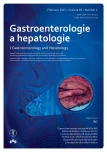Immunoablative therapy and autologous hematopoietic stem cell transplantation in a patient with aggressive Crohn’s disease refractory to medical therapy
Authors:
V. Hrubá 1
; T. Kozák 2; D. Ďuricová 1,3
; J. Novák 2; Š. Rahmatová 4; N. Machková 1; M. Bortlík 1,5; M. Lukáš Jr 1; K. Mitrová 1,6
; M. Horák 7; M. Lukáš 1,8
Authors‘ workplace:
Klinické a výzkumné centrum pro střevní záněty ISCARE I. V. F. a. s., Praha
1; Interní hematologická klinika, 3. LF UK a FN Královské Vinohrady, Praha, PRVOUK Praha
2; Ústav farmakologie, 1. LF UK, Praha
3; Ústav hematologie a krevní transfuze, Praha
4; Interní klinika 1. LF UK a ÚVN, Praha
5; Pediatrická klinika 2. LF UK a FN v Motole, Praha
6; Radiodiagnostické oddělení, Nemocnice Na Homolce, Praha
7; Ústav lékařské biochemie a laboratorní diagnostiky, 1. LF UK, Praha
8
Published in:
Gastroent Hepatol 2015; 69(1): 50-54
Category:
IBD: Case Report
doi:
https://doi.org/10.14735/amgh201550
Overview
Despite the progress in the treatment of Crohn’s disease (CD), there are still patients with refractory to medical therapy, including immunosuppressants and biologicals. Recently, a new immunoablative therapy with autologous hematopoietic stem cell transplantation (ASCT) has been proposed for the management of intractable forms. The article reports the case of the first patient with refractory CD who underwent ASCT in the Czech Republic. The patient, a 37-year-old man, after four intestinal resections with continuous disease activity despite intensive anti-inflammatory therapy, was treated with ASCT from May to July 2014 at the Department of Internal Medicine and Hematology, University Hospital Královské Vinohrady.
Key words:
Crohn’s disease – autologous hematopoietic stem cell transplantation
The authors declare they have no potential conflicts of interest concerning drugs, products, or services used in the study.
The Editorial Board declares that the manuscript met the ICMJE „uniform requirements“ for biomedical papers.
Submitted:
5. 1. 2015
Accepted:
2. 2. 2015
Sources
1. Hasselblatt P, Drognitz K, Potthoff K et al. Remission of refractory Crohn‘s disease by high‑dose cyclophosphamide and autologous peripheral blood stem cell transplantation. Aliment Pharmacol Ther 2012; 36(8): 725 – 735. doi: 10.1111/ apt.12032.
2. Al ‑ Toma A, Nijeboer P, Bouma G et al.Hematopoietic stem cell transplantation for non‑malignant gastrointestinal diseases. World J Gastroenterol 2014; 20(46): 17368 – 17375. doi: 10.3748/ wjg.v20.i46. 17368.
3. Hommes DW, Duijvestein M, Zelinkova Zet al. Long‑term follow‑up of autologous hematopoietic stem cell transplantation for severe refractory Crohn‘s disease. J Crohns Colitis 2011; 5(6): 543 – 549. doi: 10.1016/ j.crohns.2011.05.004.
4. Burt RK, Craig RM, Milanetti F et al. Autologous nonmyeloablative hematopoietic stem cell transplantation in patients with severe anti‑TNF refractory Crohn disease: long‑term follow‑up. Blood 2010; 116(26): 6123 – 6132. doi: 10.1182/ blood ‑ 2010 ‑ 06 ‑ 292391.
5. Oyama Y, Craig RM, Traynor AE et al. Autologous hematopoietic stem cell transplantation in patients with refractory Crohn’s disease. Gastroenterology 2005; 128(3): 552 – 563.
6. Daikeler T, Labopin M, Di Gioia M et al. Secondary autoimmune diseases occurring after HSCT for an autoimmune disease: a retrospective study of the EBMT Autoimmune Disease Working Party. Blood 2011; 118(6): 1693 – 1698. doi: 10.1182/ blood ‑ 2011 ‑ 02 ‑ 336156.
7. Cassinotti A, Annaloro C, Ardizzone S et al.Autologous haematopoietic stem cell transplantation without CD34+ cell selection in refractory Crohn‘s disease. Gut 2008; 57(2): 211 – 217.
8. Clerici M, Cassinotti A, Onida F et al. Immunomodulatory effects of unselected haematopoietic stem cells autotransplantation in refractory Crohn‘s disease. Dig Liver Dis 2011; 43(12): 946 – 952. doi: 10.1016/ j.dld.2011.07.021.
9. Hawkey C, Allez M, Ardizzone S et al. OC ‑ 014 clinical and endoscopic improvement following hemopoietic stem cell transplantation vs mobilisation alone in Crohn’s disease. Gut 2013; 62 (Suppl 1): A6.
Labels
Paediatric gastroenterology Gastroenterology and hepatology SurgeryArticle was published in
Gastroenterology and Hepatology

2015 Issue 1
- Possibilities of Using Metamizole in the Treatment of Acute Primary Headaches
- Metamizole vs. Tramadol in Postoperative Analgesia
- Metamizole at a Glance and in Practice – Effective Non-Opioid Analgesic for All Ages
- Spasmolytic Effect of Metamizole
- The Importance of Limosilactobacillus reuteri in Administration to Diabetics with Gingivitis
-
All articles in this issue
- News in 2015
- Not only anti-TNF for IBD patients
- Recommended surgical treatment methods in patients with idiopathic infl ammatory bowel dis eases – part 1: pre-operative preparation
- Eradication of perianal fistulas in IBD patients using the Advancement Flap method and risk factors associated with poor healing
- Vedolizumab in the therapy of ulcerative colitis patients
- Topical treatment of inflammatory bowel diseases
- The importance of fecal calprotectin in the diagnostics and treatment of inflammatory bowel diseases
- Immunoablative therapy and autologous hematopoietic stem cell transplantation in a patient with aggressive Crohn’s disease refractory to medical therapy
- A practical contribution to the diagnostics and treatment of focal nodular hyperplasia and adenomas in the liver from the perspective of a hepatologist, radiologist, pathologist and surgeon
- Short-term results of the treatment of superficial neoplastic lesions of the stomach using endoscopic submucosal dissection
- Small intestinal bacterial overgrowth syndrome
- Exviera, Viekirax
- Nutricia enteral nutrition products for children
- New members of the editorial board
- Calling for cooperation
- VIII. Beskydy Endoscopic Workshop
- Biologic therapy does not affect results of endoscopic balloon dilations in Crohn’s disease patients
- Gastroenterology and Hepatology
- Journal archive
- Current issue
- About the journal
Most read in this issue
- A practical contribution to the diagnostics and treatment of focal nodular hyperplasia and adenomas in the liver from the perspective of a hepatologist, radiologist, pathologist and surgeon
- Small intestinal bacterial overgrowth syndrome
- Topical treatment of inflammatory bowel diseases
- Eradication of perianal fistulas in IBD patients using the Advancement Flap method and risk factors associated with poor healing
